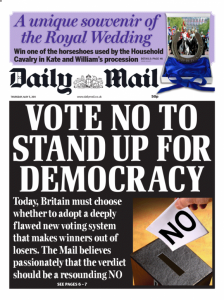Today only the second ever referendum will be held in the history of the British state. It is also the first time the result will be binding on the government. I remember the first one when we had to vote on whether Britain should continue to be a member of the European Union or the European Economic Community as it was known in 1975. I was at school at the time, just turned 18 but remember nothing about learning about it in the classroom.
Referendum Question
Based on the Conservative/Liberal Democrat coalition agreement, the referendum is to be a simple majority yes/no question as to whether to replace the current First Past the Post (FPTP) electoral system used in general elections with the Alternative Vote (AV) system. The question posed by the referendum is:
In Wales the question on the ballot paper will also appear in Welsh.
Ar hyn o bryd, mae’r DU yn defnyddio’r system “y cyntaf i’r felin” i ethol ASau i Dŷ’r Cyffredin. A ddylid defnyddio’r system “pleidlais amgen” yn lle hynny?
Using the front pages of newspapers in the classroom
The press has been very active in the campaign and these are some of the front pages of the British newspapers today. It is part of British culture at election times that editors of newspapers are never shy of directing their readers in the direction of who or what to vote for. Analysing front pages of newspapers on significant days is a great task for students in the ELT classroom and today’s papers provide engaging learning opportunities for noticing and compare and contrast activities. How much space is devoted to AV? What is the newspaper’s position? Which other issues are highlighted on the front pages and why?
It is only “The Independent” that puts the views of the three party leaders on the front page of its newspaper.
According to David Cameron, the British Prime Minister:
“It would be wrong for Britain, it is obscure, it is unfair and I believe it would be a backward step for our country”
According to NickClegg, Deputy Prime Minister and leader of the Liberal Democrats ” If
you want something a bit fairer , a bit better, which makes all politicians work a bit harder for your vote then vote yes”
And according to ED Miliband, leader of the Labour Party
“In the 10 minutes it takes to vote you could change British politics for the better.”
Over 85% of newspapers sold today in Britain support the continuation of the present system and against AV. My own views are well represented by Caroline Lucas, the only Green MP in Britain
The Green Case for AV
“The Green party has been fully supportive of the Yes Campaign, on the basis that it represents a step towards strengthening our democracy – and because we think it’s right that MPs, who will need to secure at least 50% of the vote to be certain of winning, will have to reach out more widely to keep voters’ support.
The current first-past-the-post system was designed for a different age, when 95% voted for the two main Westminster parties; at the last election this fell to 65%. Today, as there is ever greater pluralism in our politics, it’s clear that we need a reformed voting system that delivers fair representation.
To my mind, there is no doubt that AV is an improvement on FPTP, which will give the public a greater voice, reduce the likelihood of safe seats and tackle the cynicism of large-scale tactical voting.
While it’s no secret that many of us would have preferred a system of proportional representation, that option is not on the ballot paper. We should not let the best be the enemy of the good.
Whichever way you look at it, a “No” vote would be interpreted by this government as a vote against change. It would maintain the status quo and set back the campaign for wider constitutional reform by at least a generation. From a democratic perspective and from an environmental one, this is a setback we can ill afford.”
An integral part of intercultural education in ELT
The arguments for and against a change in the electoral system can be found here. An analysis of the front page of the British newspapers today along side the circulation figures might be an enjoyable and creative task in some ELT contexts. As a part of citizenship and media education in Seconday Schools, both inside and outside Britain, this kind of comparative, contemporary and critical approach to intercultural education has long been part of British Studies projects within the British Council since the projects were launched in Eastern and Central Europe after 1991. It is also something I work on in the Applied Linguistics Department at ELTE, the university I teach in in Budapest.
Politics in class?
Some people argue that doing this kind of thing is being too political, however it can be argued that it is just as political not to do it. If it is desirable to have a well-educated society, then education for citizenship, part of which is knowledge of the electoral system, is an educational responsibility which all schools are faced with. Critical reading within a critical media programme within English language lessons with 17/18-year-old students is one place where this could and maybe should happen.
A cat-friendly explanation of the Alternative Vote System
And if you are still not sure about the AV system then this video will help you to decide how to miaoooooow and how we will have much happier kitties in the future. The dog has always won very easily in the past without actually having to put too much effort into it.
Education for citizenship for cats and humans alike, all stand to benefit















